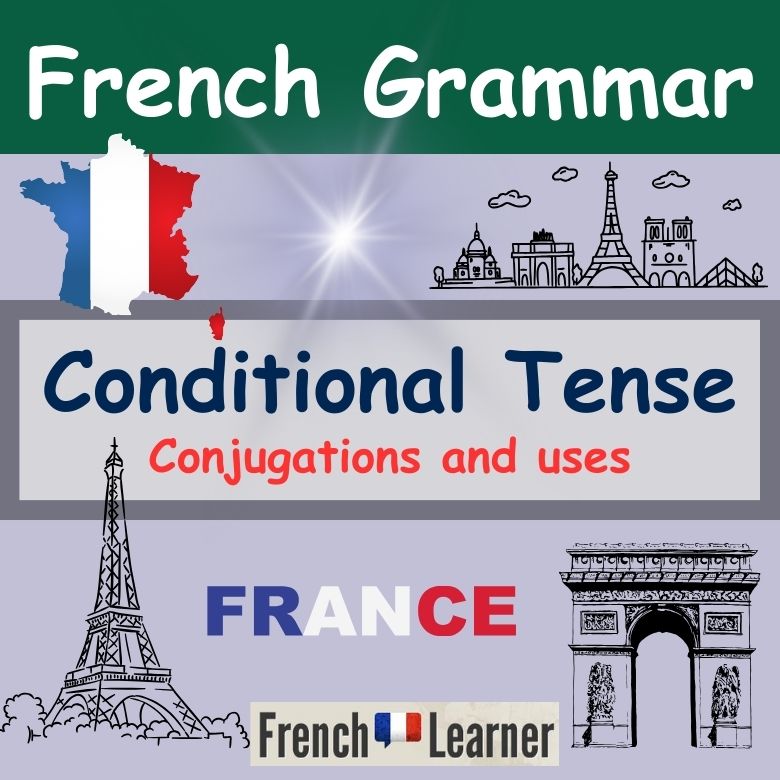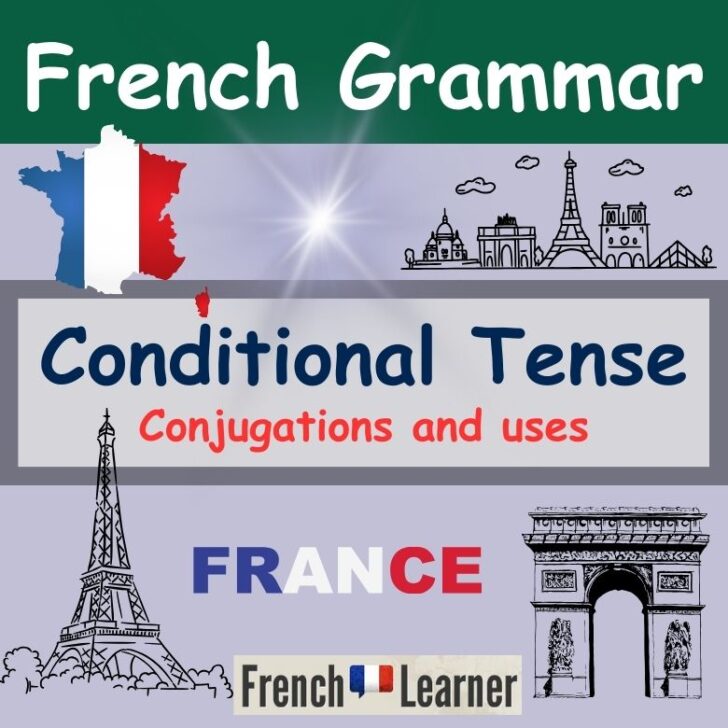The French conditional mood is used to express hypothetical (would) events. Usages also include polite requests and si clause sentences (if…then). The conditional is called le conditionnel in French and its endings are –ais, -ais, -ait, -ions, -iez, -aient (the imperfect endings).

French conditional tense
Present conditional
To conjugate the present conditional (le présent du conditionnel), add the conditional ending to the infinitive, just as you would when forming the future tense. For regular -re verbs add the endings to the infinitive minus the final -e.
For verbs with irregular stems, add the conditional ending to the irregular stem.
Present conditional conjugations for regular verbs
| PARLER TO SPEAK | |
| je parlerais tu parlerais il parlerait | nous parlerions vous parleriez ils parleraient |
| FINIR TO FINISH | |
| je finirais tu finirais il finirait | nous finirions vous finiriez ils finiraient |
| VENDRE TO SELL | |
| je vendrais tu vendrais il vendrait | nous vendrions vous vendriez ils vendraient |
Present conditional for common irregular verbs
The following verbs have irregular conditional stems which we have indicated in quotation marks.
- aller (to go) -> “ir” -> j’irais (I would go)
- avoir (to have) -> “aur” -> j’aurais (I would have)
- devoir (must) -> “devr” -> je devrais (I should)
- être (to be) -> “ser” -> je serais ( I would be)
- faire (to make, do) “fer” -> je ferais (I would make, do)
- falloir (to be necessary) “faudr” -> il faudrait (It would be necessary)
- pleuvoir (to rain) “pleuvr” -> il pleuvrait (It would rain)
- pouvoir (to be able, can) “pourr” -> je pourrais (I could)
- savoir (to know) “saur” -> je saurais – (I would know)
- tenir (to hold) “tiendr” -> je tienrais -> (I would hold)
- venir (to come) “viendr” – >je viendrais -> (I would come)
- voir (to see) “verr” -> je verrais (I would see)
- vouloir (to want) “voudr” -> je voudrais (I would want)
How to use the conditional tense in French
The conditional has many uses including the expression of wishes and polite suggestions. The French also use it in journalism to mean allegedly or reportedly.
1. Wishes or suggestions
The following example sentences of the present conditional are straight “would” sentences.
- J’aimerais acheter une nouvelle maison. I’d like to buy a new house.
- Ce serait sympa de faire du ski demain. It would be nice to go skiing tomorrow.
- À ta place, j’achèterais cette nouvelle paire de skis. If I were you, I’d buy this new pair of skis.
- Elle voudrait commencer son nouveau travail demain. She’d like to start her new job tomorrow.
2. Polite requests
The following conditional sentences are all examples of polite requests.
- Est-ce que tu pourrais m’aider? Could you help me?
- Voudriez-vous venir chez nous demain? Would you like to come to our place tomorrow?
- Pourrais-tu m’expliquer ce mot? Could you explain this word to me?
3. Journalistic usage
In journalism, the conditional is used to express events that reportedly or allegedly occur.
- Le premier ministre serait ici demain. The prime minister will reportedly be here tomorrow.
- Le directeur signerait un contrat demain. The director will reportedly sign a contract tomorrow.
- Le comedien se présenterait sur scène demain. The actor will reportedly appear on stage tomorrow.
4. Si clauses using the conditional
Si clauses are hypothetical “if…then” statements: If situation A happens, then situation B would result. The grammatical word order is: If + imperfect, then + conditional.
- Nous partirions en vacances si nous avions plus de temps. We’d go on vacation if we had more time.
- Elle achetèrait la voiture si elle avait plus d’argent. She’d by the car if she had more money.
- Si j’avais plus d’argent je voyagerais plus souvent. If I had more money I’d travel more.
Past conditional tense
The French past conditional, also called the conditional perfect, is a compound tense formed with the auxiliary verbs avoir or être in the present conditional and the past participle. For example, “J’aurais mangé” (I would have eaten) and “Je serais allé” (I would have gone).
Conjugation
| Parler -> would have spoken | |
| j'aurais parlé tu aurais parlé il, elle aurait parlé | nous aurions parlé vous auriez parlé ils, elles auraient parlé |
| Aller -> would have gone | |
| je serais allé(e) tu serais allé(e) il, elle serait allé(e) | nous serions allé(e)s vous seriez allé(e)(s) ils, elles seraient allé(e)s |
| Se lever -> would have gotten up | |
| je me serais levé(e) tu te serais levé(e) il, elle se serait levé(e) | nous nous serions levé(e)s vous vous seriez levé(e)(s) ils, elles se seraient levé(e)s |
Examples
Uses of the conditionnel passé consist of expressing regret for an action that never occurred and hypothetical situations of events that did or didn’t take place. J’aurais dû + infinitive indicates “I should have”.
The past conditional also has a journalistic use for events that allegedly or reportedly occurred.
Expressing regret, talking about things that never happened
Here are some examples of the past conditional expressing regret about past actions.
- J’aurais tellement aimé y aller. Would have loved to go.
- Tu aurais dû commander la pizza. You should have ordered the pizza.
- J’aurais su la verité. I should have known the truth.
Si clause with the past conditional
The past conditional is also used to express hypothetical past situations. The grammatical structure is: If A had (not) happened (plus-que-parfait), then B would have (not) happened (past conditional).
- Si j’avais su, je ne serais pas y allé. If I’d known, I wouldn’t have gone.
- J’aurais acheté la voiture si j’avais eu assez d’argent. I’d have have bought the car if I’d had enough money.
- Elle serait allée en France si elle avait eu plus de temps libre. She would have gone to France if she’d had more free time.
Journalistic usage
The past conditional is also used to expressed both allegedly and reportedly in the past.
- Le premier ministre se serait rendu aux États-Unis. The prime minister reportedly made it to the United States.
Related Lessons:
- Imperfect tense
- Verb tense guide
- Reflexive verbs
- Guide to verb conjugations
- Irregular verbs
- Imperative
- Subjunctive
French grammar | Lessons by David Issokson

